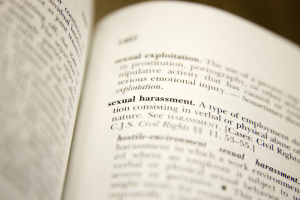 Both women and men can be sexually harassed at the workplace. Harassment comes in many forms, from the most subtle comments to far more lewd behavior. However, many individuals who find themselves feeling harassed worry that no one will believe them—or worse, that there is nothing they can do. If you feel harassed at work, you may not be sure whether it really counts as “sexual harassment” or whether there is anything a lawyer can do. Here in New Jersey, sexual harassment lawyers often hear from individuals who waited months or years to speak up. You do not have to wait that long.
Both women and men can be sexually harassed at the workplace. Harassment comes in many forms, from the most subtle comments to far more lewd behavior. However, many individuals who find themselves feeling harassed worry that no one will believe them—or worse, that there is nothing they can do. If you feel harassed at work, you may not be sure whether it really counts as “sexual harassment” or whether there is anything a lawyer can do. Here in New Jersey, sexual harassment lawyers often hear from individuals who waited months or years to speak up. You do not have to wait that long.
Sexual harassment can be a single act, or it can repeatedly or pervasively. It can come from one person or multiple people. And it can be very overt, or more subtle. Chances are, if you feel harassed at work then you should seek legal advice.
In New Jersey there are three main kinds of sexual harassment recognized by the law: quid pro quo, hostile work environment caused by repeated (pervasive) actions, and hostile work environment caused by a single severe act.
Quid Pro Quo Harassment (a “Proposal”)
Quid pro quo is just a Latin phrase that means “this for that” – a trade-off or bargain. Quid pro quo sexual harassment happens when a supervisor tells you that your job (or a promotion, bonus, etc.) depends on a sexual favor. The favor can be as mild as going out on a date, or much more explicit. Any romantic/sexual condition put on your career future is sexual harassment. Quid pro quo harassment may even occur when there is a consensual sexual relationship that ends and the other party exerts job-related pressure as a result of the ended relationship.
Repeated Hostile Behavior
Sometimes sexual harassment isn’t an explicit proposal. Instead, a coworker or supervisor uses sexual pressure or makes sexual comments that make the workplace uncomfortable for you. This is known as a “hostile work environment.”
A hostile work environment can be created even by seemingly minor actions—if they happen often enough. The actions or comments do not have to be all of the same time, but if it happens often enough to make you feel that the terms and conditions of your employment have changed, then it is considered pervasive and is actionable.
A Single Hostile Act
Hostile behavior does not have to be repeated to count as sexual harassment. If an act is severe enough, one time is all it takes. Severe hostile behavior can take many forms—but you know it when you see it. Any explicitly sexual act, statement or proposition can create a hostile work environment. That’s harassment.
We have been fighting to protect the rights of victims of sexual harassment for over two decades. Some of our successes are listed here: http://www.schorrlaw.com/successes/. If you have experienced any of these types of sexual harassment, we can help protect you and get you fair compensation. Feel free to give us a call at 856-874-9090 for a free initial telephone consultation.